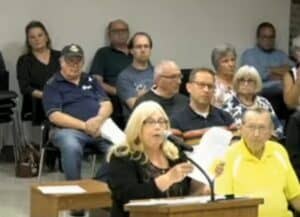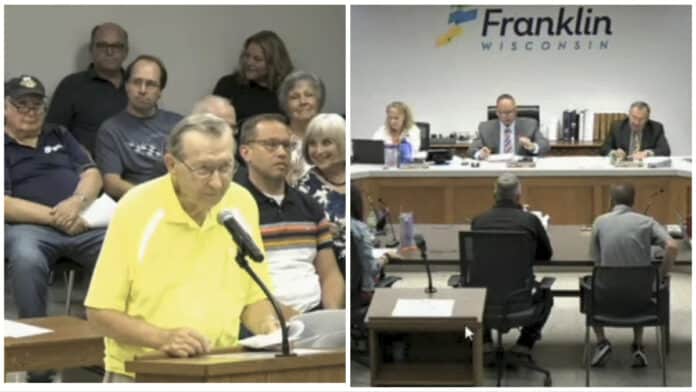At times, the meeting grew testy. However, speakers also stressed a need to improve communication going forward.
Neighbors and aldermen raised questions about a proposed “memorandum of understanding” between the City of Franklin and the Rock sports and entertainment complex at a Tuesday Common Council meeting, with several residents expressing concern about a provision that includes a near-blanket assurance granting future permits for special events at the Rock without any specific new decibel-limit being reached.
“I’m here as one of the seniors in this city…You people aren’t taking good care of us. I’m 95 years old, and I don’t like putting up with some of this stuff,” an affected neighbor, Le Roy Lewandowski, told city officials. “Please, we have to do something. I feel like I’m in a city that I don’t have the power to do anything.” He said the Rock’s developer, Mike Zimmerman, is a friend of his.
Lewandowski said the recent noise scared a 90-year-old woman who lives next to him.
Neighbors are especially upset that Franklin’s earlier agreement with the Rock set the allowed decibel levels much higher (79) than the regular city noise ordinance allows.
The Rock was represented at the meeting by Zimmerman and Milwaukee County Supervisor Steve Taylor, who works for the Rock. Zimmerman said the provision on permits was important to the Rock. “If we are going to negotiate with the city in good faith, what we do ask for is terms that allow for us to run our business,” he said.
Alderman Mike Barber said he wanted to mitigate the adversarial roles. “We still have to have methods to protect our citizens and that is something that I as an alderman would not want to give up,” he told Zimmerman.

However, despite the at times-collaborative language, tensions still flared, especially when Zimmerman and Taylor first spoke to the Council after a lengthy and emotional public comment session. Several speakers claimed Franklin is getting a black eye on talk radio because the sound issues haven’t been fixed.
Taylor called a citizen, Orville Seymer, a “goof” during one exchange, and Zimmerman got into a brief heated exchange with a neighbor in the audience when Zimmerman sarcastically referred to the man’s wife by her first name, Joy, while saying some of his critics were ignorant. Watch:
The Rock’s representatives and city officials stressed the MOU was a work in progress, not a final document. The document represents an attempt by the city to resolve neighbors’ long-standing noise concerns, which they say are destroying their quality of life.
The controversial passage on extraordinary events in the MOU says,
“Extraordinary Events. The City of Franklin agrees to support the entertainment efforts of Ballpark Commons for extraordinary events such as concerts, fireworks, and seasonal events (Hill Has Eyes, Enchant). The City of Franklin will not withhold permits and approvals unless there are direct violations of sound ordinance and/or reasonable compliance concerns with city departments (fire, police, health, etc.) and municipal codes as outlined in the new PDD (city agreement with the Rock).”
That concerns some neighbors, who think it means the city will lose all leverage.
Neighbors have contended that the city’s development agreement and practices have made it impossible for the Rock to have violations. The decibel level set in the city’s development agreement with the Rock (called the PDD) is 79, much higher than Franklin’s regular noise ordinance allows and other guidelines. Furthermore, a violation is not counted unless it occurs for 30 minutes straight. Many neighbors said the 79 decibel limit, and how it came to be, is the crux of the problem.
The MOU does not specify a new decibel level. Instead, it says, “Following execution of this MOU, the parties agree to begin negotiations on a new decibel level agreement by type of event. Specifically, the parties agree to adjust volumes to comply with 3 different thresholds for Milkmen games (based on attendance and/or day of the week), extraordinary events, and fireworks.”
Andy Kleist, of Franklin, said the MOU “does little to mitigate the noise issues.” He said the Umbrella Bar should be included in speaker adjustments.
The section for extraordinary events is “an entitlement for the Rock and should be removed. It does not benefit the neighbors in any way,” he said.
“There is consistently no consideration for the impact on families,” he said, calling the city’s behavior “unacceptable and negligent.”
The full MOU can be read here.
Aldermen React
“I think it’s a beginning step,” said Alderman Mike Barber, of the MOU, but he said it lacked details. “I don’t understand the monitoring,” he said, adding that he also doesn’t understand some of the decibel levels in the MOU. “I think it’s a first step.” He said he wanted a more open process involving citizens and other aldermen.
Alderwoman Michelle Eichmann spoke in glowing terms about the Rock.
“What would Franklin be without the Rock?” Eichmann said, adding that the document was a good start. The Rock is a complex that hosts a summer concert series, fireworks, a Halloween event, Milkmen baseball games, a rap concert, a taco and tequila event, and more. It is located adjacent to residential neighborhoods on an old landfill site.

Alderwoman Courtney Day said the MOU was a good document to start with, but she raised concerns about reopening the entire PDD. Turning the speakers in and down should help a lot, she said. Day was also concerned about the section in the agreement promising permits for special events.
Mayor John Nelson said the MOU is a “working document” that will include additional input.
Alderman Ed Holpfer said there are things in the MOU that are “not acceptable.”
Zimmerman said he believed the agreement (called the PDD) needed to be opened up.
Tempers Flare
Taylor addressed conflict-of-interest concerns at the meeting, sitting next to Zimmerman at the table facing aldermen.
At the meeting, Supervisor Taylor read from a letter he sent on May 13, 2022, to the County disclosing the conflict of interest with the Rock, saying that he would “not be voting or participating in any debate on Rock-related items and would abstain” on any votes before the County Board or subcommittees involving the Rock.
“I have distanced myself. Why? Because of where I work,” Taylor said. He called citizen Orville Seymer a “goof” after Seymer said from the audience that he has four open records requests pending against Taylor.
“That’s the whole conflict of interest that talk radio and bloggers want to write about and that’s fine. But keep on digging because there’s nothing there and I know the difference,” Taylor said, referring to his dual role as a county supervisor and Rock employee. The County also has a separate development agreement with the Rock, and some county supervisors have said they want to explore whether the county can take legal action due to the noise concerns.
Zimmerman labeled the perception that the Rock “hasn’t done anything” “complete ignorance.” When people made retorts from the audience, he said, “It’s the definition of ignorance. So we’re going to review the facts, Joy.” It appears he was referring to one of the neighbors who spoke earlier in the meeting.
“That’s my wife,” a man from the audience retorted. “Don’t talk to my wife like that.”
The mayor interjected, “Well, if we have to, we’ve got the Police department… It’s order.”
“I called her, her name, mayor. Apparently he’s insulted by that,” Zimmerman said. “Oh, it’s the tone? Got it.”
At other points, Zimmerman said he wanted to work with the city, but he repeatedly called it a “negotiation.”
“We also sit here and are willing to change things,” Zimmerman said. He said the MOU was the result of “those negotiations.”
However, he also said: “We by no means, if you guys don’t want to sign this. We have an agreement. We’re comfortable where we’re at.”
The mayor said the MOU would require the city to take over sound monitors and place the results online so people can see “in real time where it’s at.”
The 79 Decibel Limit
Neighbors and a county supervisor singled out the 79-decibel limit in the city’s agreement with the Rock as the main problem, saying that the county never approved that level, and it’s much higher than the regular Franklin noise ordinance.
Milwaukee County Supervisor Patti Logsdon said she wanted to “set the record straight” on the 79-decibel limit that was set by the city for the Rock.

She said the county development agreement never suggested a sound limit. “We did not set this,” she said. The actual Franklin noise ordinance is supposed to be 55 decibels in the day and 45 at night, and she said that a separate Franklin ordinance that mentions 79 decibels is by permit only and is “for things like fireworks. We don’t expect noise levels like that in a residential area.”
Joy Draginis-Zingales of Greendale – the woman mentioned by Zimmerman – said she was asked to be a voice for her subdivision. “79 decibels was never approved at the county…the county doesn’t have the right to do that.” She said the agreement needed to involve everyone coming to the table.
Dana Gindt of Franklin also said it was “incorrect to say the county approved 79 decibels.” She said this was used as justification for the number to be placed in the city PDD, but that justification was false.
“For the last 10 years, it has been nothing but chaos. Loud music for no reason,” neighbor John Czaskos, 80, said. He has lived in the area for 40 years.
Zimmerman stated that, within the city development agreement, the Rock is allowed to go up 79 decibels. He said the Rock has made changes over the years, including installing light shields, LED lights, and the installation of sound monitors, as well as a reduction of nights for the Halloween event (a $200,000 county sound study found that most of the monitors were inoperable).
Neighbors and a county supervisor urged the city to follow its noise ordinance that requires a 50-decibel limit, with 45 decibels at night.
Name Calling Criticized
Dale Kirner, of Franklin, told city officials that his name is “not terrorist. It’s not NIMBY. It’s not *ucker. I’m not a Karen.” He was referring to a recent Wisconsin Right Now story that revealed the names some neighbors and county supervisors were called during a closed meeting between the mayor, director of administration, a city alderman, the developer Mike Zimmerman, and Milwaukee County Supervisor Steve Taylor, who works for the Rock’s foundation. They came up with the proposed MOU at that meeting.
He said the press coverage has helped the neighbors. He also thanked Alderman Jason Craig.
“If you don’t think the city of Franklin is being laughed at right now, you’re not listening to morning talk shows,” Kirner said. With the help of the publicity, “This is coming to light. We’re not bad people. We help each other out,” Kirner said.
Neighbor Debbie Davis said she appreciated officials’ integrity and felt the MOU was created with good intent, but she said active directives should be used instead.
Donnella McAdams, of Franklin, said, “This noise intrusion has been allowed for 10 years for hundreds of events with amplified noise extending for two miles.” She said the recent $200,000 sound study confirmed what neighbors have been saying for years.
Citizen Rich Busalacchi read passages of Wisconsin Right Now’s article on the emergency meeting and said to the mayor, John Nelson, “Your administration, you and some of the common council members are bought and paid for by Rock and Mike Zimmerman.”
“That’s ridiculous, absolutely ridiculous,” the mayor responded, saying Busalacchi was making “public lies.”
Busalacchi said he was concerned about the vagueness of the MOU. He said there have been 10 years of “unfulfilled promises.” He said the MOU makes the City of Franklin an “arm of the Rock,” and a “company town.”
Zimmerman trashed Busalacchi for his “hate speech,” accusing him of “non-facts.”
Busalacchi retorted to the mayor, “You could not even defend your residents in the closed meeting. Franklin is now the laughingstock of local communities.” He said Franklin should “get rid of the MOU and the Trojan horse agreements.”
Neighbors Unload About the Rock Noise Issues
Claire Vitchick, of Franklin, declared, “I’m so disgusted with the city, I can’t believe it. I pay for police that don’t come. What kind of city is this? It’s a joke.”
For his part, Orville Seymer told the Common Council that Milwaukee County Supervisor Steve Taylor “is the problem in this. He has a long history of vindictive, retaliatory behavior.” He asked Zimmerman to “rein in Steve Taylor.”
He said Franklin officials were getting beat up badly on talk radio over the Rock issue.
Steven Green, of Franklin, said the MOU marks an opportunity to move forward. “The Rock is good for Franklin. The people who live there deserve to be happy.” He said people “have to work together.”
He asked the Common Council and developer Mike Zimmerman to show neighbors “mercy.”
Supervisor Kathleen Vincent, who represents Greendale, told Franklin aldermen that she was “asking you to consider the lives being impacted by the sound.”
She said that county supervisors should be included in meetings about the Rock and asked for “transparency” in meetings.
Andy Pelkey, of Franklin, said he was glad that “some progress is being made” but chastised the City of Franklin for ignoring the problem over the years, “letting it fester for years and years and years like this issue has.”
“The city has a history of ignoring the facts,” he said.
He noted of an item in the proposed MOU to move speakers so they don’t point at the neighborhood, “Why wasn’t this already being done?”
Tom Kowalski, of Franklin, said that the MOU “talks about good faith,” but that he doesn’t trust that anything is in good faith anymore.
He criticized Franklin’s practice whereby a sound violation is not registered unless it’s gone on for 30 minutes straight. “A single break in the song will get them off,” Kowalski said.
“Are we giving away the farm on this?” he asked.
Neighbor Bob Knoll said the Rock is a “fantastic development” but raised concerns about a proposed sound fence’s location. His wife, Naomi Knoll, also raised concerns about the Umbrella bar and sound fence working.
Table of Contents










![WATCH: Elon Musk Town Hall Rally in Green Bay [FULL Video]](https://www.wisconsinrightnow.com/wp-content/uploads/2022/04/Elon_Musk_3018710552-356x220.jpg)



![The Wisconsin DOJ’s ‘Unlawful’ Lawman [WRN Voices] josh kaul](https://www.wisconsinrightnow.com/wp-content/uploads/2025/03/MixCollage-29-Mar-2025-08-48-PM-2468-356x220.jpg)







![Phil Gramm’s Letter to Wall Street Journal [Up Against the Wall]](https://www.wisconsinrightnow.com/wp-content/uploads/2025/03/gramm-356x220.png)











